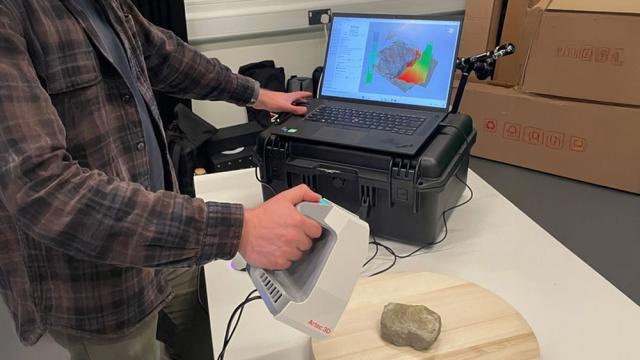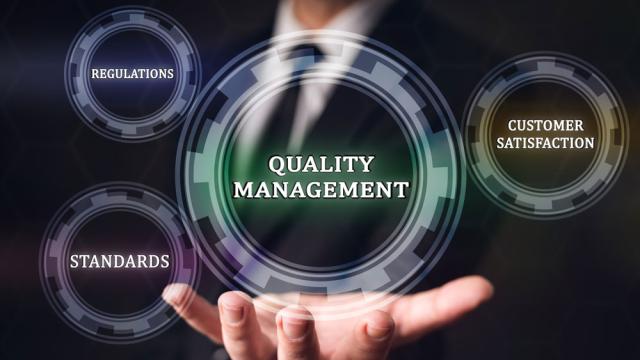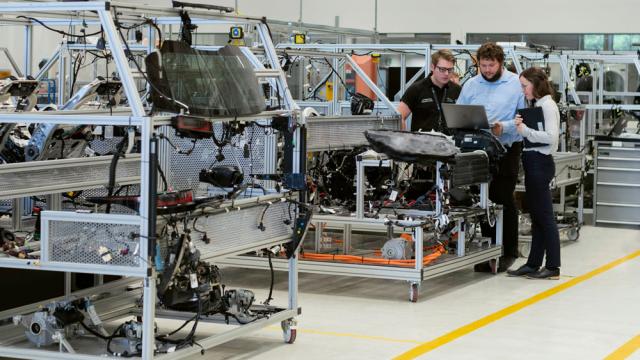All Features

Susan Robertson
In some organizations, possibility feels like a luxury. Something you talk about at offsite sessions. Something you reference in mission statements. Something you save for after the real work is done.
But in visionary organizations, possibility is the work.
Visionary leaders understand that…

Brian Brooks
The manufacturing world is undergoing a major shift. Supply chain shocks, reshoring, a busy merger and acquisition landscape, and other disruptions are prompting many manufacturers to rethink their operations with the hope of mitigating risk, building resilience, and gaining more control.
Although…

Peter Chhim
During the last couple of decades working in quality, I’ve lost count of how many times I’ve seen the same pattern play out: A strong launch. Tight focus. Great early results. People doing the right things for the right reasons. Controls are followed. Issues are surfaced quickly. Leaders are…

Rebecca Okamoto
Jennifer had a problem. She was the program manager for the No. 2 business priority at a multibillion-dollar company, rolling out sustainability programs in manufacturing. But when she presented, she kept hearing: too complicated, too time-consuming, too costly. And she couldn’t figure it out.
She…

Chip Bell
‘I don’t want my Dollar General store to look like a Dollar General store!” That was the owner’s assertive Sunday morning response to a sincere compliment on her immaculate, well-organized store. Her loud echo of pride stood in contrast to two other Dollar General stores in the same area,…

Gleb Tsipursky
The future of flexible work will not be decided by floor plans or badge swipes. It will be decided by who gets to build the tools.
Fresh evidence from a new global survey shows the shift in plain numbers. GoTo and Workplace Intelligence asked 2,500 people across roles and countries about AI and…
Quality Digest
(Michigan Metrology: Livonia, MI) -- Registration is now open for the annual “Surface Roughness, Texture, and Tribology” short course, presented in Livonia, Michigan, May 13–14, 2026. The two-day class offers a unique opportunity to learn the fundamentals of surface roughness and tribology and how…

Mike Figliuolo
It’s a terrible feeling to put a ton of effort into crafting a recommendation only to have it shot down in front of all your co-workers. If you want your idea approved, you should try doing things backward instead.
Think about how you craft a recommendation. Typically, it goes something like this…

Eleazer Carmelli-Kim, Kevin Atkins
As the holiday season is left behind, many manufacturing leaders find a moment to step back from year-end deadlines to reflect on the bigger picture and look ahead. One question often surfaces during that quieter reset: Where will the next generation of engineers, designers, and problem-solvers…

Donald J. Wheeler
Performance indexes use the global standard deviation statistic to describe the past. Capability indexes use a within-subgroup measure of dispersion to characterize the process potential. However, some within-subgroup measures are better than others. This article will explain why you should not use…

Joe Curcillo
Most leaders you meet are losing almost a full workday every week to meetings that go nowhere. Same people. Same topics. Same problems. No real movement.
You’ve seen it in boardrooms and job trailers: different settings, but the same pattern. The problem isn’t meetings; it’s that your meetings are…

Kate Zabriskie
Something goes sideways at work—missed deadlines, bad customer feedback, you name it—and the first suggestion is, “We need training!” Sound familiar? It’s like reaching for a Band-Aid when what you really need is a lifestyle change. Training can be powerful, but it shouldn’t be your knee-jerk…

Angie Basiouny
A missed birthday. A forgotten anniversary. A milestone that goes unnoticed. These small slights from a manager may seem like no big deal, but new research from Wharton reveals that even the mildest mistreatment at work can affect more than just employee morale.
The study found that when managers…

Paul Hanaphy
Traditional styles of lecturing and imparting information can be ineffective in terms of student engagement and triggering deeper learning. This is especially challenging in certain subjects that are difficult to teach in a classroom anyway, and for those who process information differently.…

Jen Chang
Increasingly, inspectors for the U.S. Food and Drug Administration (FDA) will evaluate your CMMS provider’s security controls—not just your internal procedures. In a cloud-hosted GxP environment, data doesn’t stop at your firewall; your vendor’s security posture becomes part of your compliance…

CANEA
The digitalization of society during the last decade has created many opportunities for businesses and organizations. But digitalization, combined with a rapidly changing world, has also opened new threats and vulnerabilities that can cause serious damage to businesses. Every day we see headlines…

Chris Pinaire
The manufacturing industry is undergoing a transformation driven by rapid technological advancements, changing consumer preferences, and evolving regulatory frameworks. Manufacturers everywhere face unprecedented challenges as they seek to remain competitive, profitable, and sustainable in the face…

Elizabeth Weddle
Early-stage medtech companies are under tremendous pressure to develop quickly, prove value, and obtain regulatory approval or clearance as fast as possible. The pace of innovation in the industry has increased tremendously, thanks to more options for outsourcing and new technology like 3D scanning…

Ken Eme
When I first became involved in lean (continuous improvement), I was the VP of operations at a privately held company in the Midwest. It was 2003, and as a newly promoted senior executive I was eager to find a strategy that could make a real difference in our operations.
I quickly realized that…

Harish Jose
In this article I want to spend time with Søren Kierkegaard. I’ve been interested in his ideas because he occupies an unusual place in the history of thought. He’s considered a pioneer of existentialism, and yet he was also a man of faith.
Most of the existentialist thinkers who followed him,…

Mike King
As we look ahead to 2026, the medtech sector stands at an intersection of regulatory evolution, technological advancement, and operational transformation.
The landscape for quality and regulatory affairs (QARA) professionals continues to shift, driven by emerging AI capabilities, changing…

George Yang
Your IT team enabled Copilot and Gemini last quarter without checking with the lawyers. Now your employees are putting company secrets into systems that nobody owns, nobody governs, and nobody can reliably retrieve when opposing counsel sends a subpoena.
You have a discovery problem, and it’s…

Gleb Tsipursky
The demos look slick, the promises even slicker. In slides and keynotes, agentic assistants plan, click, and ship your work while you sip coffee. Promoters like McKinsey call it the agentic AI advantage.
Then you put these systems on real client work and the wheels come off. The newest empirical…

Maartje van Krieken
Performance rarely collapses with fanfare. More often, it flatlines quietly; sales soften, productivity slows, priorities blur, and yet teams run hard without moving the needle. In 2025, the RSM U.S. Middle Market Business Index slid from the low 140s into the low 120s in a short period, with fewer…

ISO
In today’s digital age, the question isn’t whether you’ll experience a cybersecurity attack, but when this might occur. Cybercriminals strike when you least expect it, with devastating consequences for your day-to-day operations. If your organization is lucky, it can block the attacker and limit…